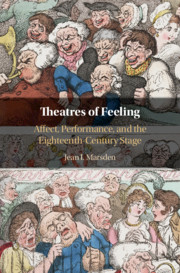Chapter 1 - Divine Sympathy: Theatre, Connection, and Virtue
Summary
The first chapter ( ‘Divine Sympathy ‘) examines theories of the theatre and its role in society as articulated in the moral philosophy and literary criticism of the second half of the eighteenth century. It considers theatre’s unique moral function as epitomized in its ability to elicit sympathy, using the works of Scottish Enlightenment figures such as Henry Home, Lord Kames, David Hume, and Adam Smith, especially Smith’s influential Theory of Moral Sentiments. As this chapter demonstrates, the stated goal of drama – and of art in general – was to prompt a sympathetic identification with the events represented. In the eighteenth century, drama ‘s ability to inspire this response within its audience was the source of its moral power; the experience of sympathy prompted the exercise of virtue because identifying with the distress or pleasure of the characters on stage led spectators to moral actions outside theatre. Thus theatre became an important building block for the moral society that Smith described. Because of its ability to inspire sympathy, theatre taught virtue more effectively than any other art form, more so even than the pulpit.
Keywords
- Type
- Chapter
- Information
- Theatres of Feeling , pp. 18 - 40Publisher: Cambridge University PressPrint publication year: 2019

